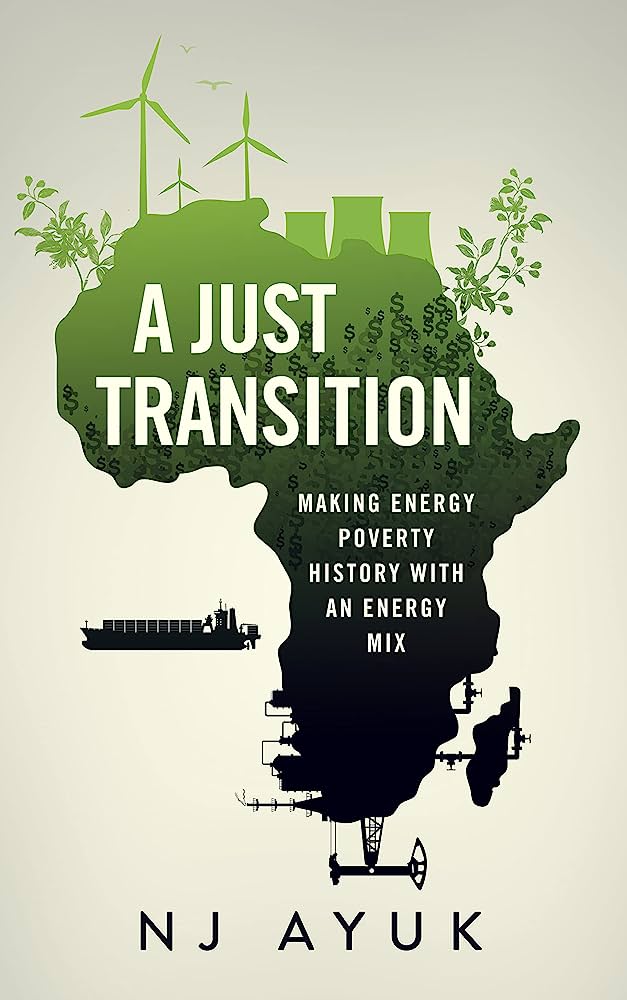A Just Transition: Making Energy Poverty History with an Energy Mix by NJ Ayuk; published by Made for Success Publishing (2022)
A Just Transition by NJ Ayuk is a clarion call to various institutions, namely international bodies, non-governmental organisations, and African governments, to adopt a blended and balanced approach in the fight against climate change in a continent still battling with an energy poverty crisis.
According to the International Energy Agency (IEA), 600 million people in sub-Saharan Africa have no access to electricity, this amounts to three-quarters of the global population of approximately 940 million without access to reliable power.
Ayuk asserts that a lack of access to electricity of such magnitude is no trivial matter. Without electricity, 600 million Africans will not achieve the same levels of health and wealth that prevail in more developed countries.
Moreover, they will struggle individually and collectively to achieve economic development. But solving the problem of energy poverty is not that simple, as the detailed and country-specific examples illustrated throughout the book demonstrate.
The current conundrum is that Africa bears a disproportionate share of not only the anticipated future problems of climate change but the here-and-now problem of energy poverty. Approximately 16% of the world’s population lives in Africa but produces less than 3% of the cumulative global carbon emissions.
At the same time, since the continent is at a lower level of economic development it exhibits less resilience in the face of climate-change-related adverse effects such as rising sea levels, flooding, drought and other forms of extreme weather, all of which lead to food insecurity or large-scale population movements. Moreover, since most Africans rely on farming for their livelihoods, a larger share of its population risk being displaced or put out of work if land becomes unproductive due to climate change.
But Ayuk questions: should the goal of preventing climate change supersede the goal of addressing energy poverty? The solution put forward by the International Energy Agency (IEA) [and others] is that renewable energies are the answer to Africa’s energy poverty, which proposes that African countries should abandon all fossil fuel development and focus solely on renewable energy from sources such as solar and wind.
However, banning energy projects in countries that rely on coal, gas and oil for revenue will have dire consequences. The most vulnerable are countries with a lower capacity to diversify and/or are less stable politically. This will result in shrinking hydrocarbon revenues, failed attempts to revive flatlining non-oil sectors and eventually, political turmoil. Mozambique is cited as an example of what that might look like – one cause of violence in Cabo Delgado in the northern region is reportedly due to unemployed youth who believe the government has kept them from benefiting from the province’s ruby and natural gas industries.
Cognisant of the limitations facing developing nations, in 2009 the global community offered to support the transition of African countries to renewable energy, by committing to fund an amount of $100 billion a year as “climate financing aid for less developed countries” by 2020. At the time of writing, Ayuk points out that the donor countries were still yet to honour their pledges.
Consequently, Ayuk advises that instead of perpetually waiting for aid, Africa should transition from fossil fuels in its own way by moving forward in a manner that allows it to develop its energy capacity to the greatest extent possible on every front.
This means making the most of energy resources available abundantly, namely fossil fuels such as natural gas and oil. He puts forth that the transition process should focus on natural gas first and phase in renewables over time.
The justification for natural gas is mainly due to the substantial quantities of both natural and associated gas reserves. Africa’s reserves measure 22.7 trillion cubic meters (tcm) altogether (802 trillion cubic feet), with about three-quarters of the total located in sub-Saharan Africa. This excludes the unconventional and offshore basins that remain unexplored or under-explored.
Ayuk also adds that gas isn’t solely attractive due to its abundance. It is a lucrative resource because of its high energy density that makes use of low-cost, high-efficiency technologies that African countries can easily access.
And even though gas generates carbon dioxide and methane emissions, its carbon footprint is less than that of coal or petroleum products, both of which are in use in many of Africa’s existing thermal power plants (TPPs).
Furthermore, considering that millions of Africans depend on inefficient – and unhealthy – biofuels such as wood and charcoal, which contribute to deforestation and pollution, it is important to increase gas production to produce electricity and along the way, use it to produce propane and butane, both of which are components of liquified petroleum gas (LPG). Additionally, gas has the potential to create jobs both directly and indirectly in various industrial and manufacturing sectors.
Correspondingly, Ayuk submits that although renewable energy sources reduce carbon emissions, they have significantly lower power density than fossil fuels, are more expensive, and the energy produced is harder to store. This is because the batteries used have limited capacity to make up for the acute and prolonged power outages rife in most African countries. The objective, therefore, is, as renewable energy technology improves, to relegate gas-fired plants to backup units – useful only for covering the gaps that emerge when the periods of sunshine (for solar panels) and wind for turbines are low. Ultimately, as battery technology improves, gas plants will be phased out.
Like gas, Africa’s petroleum-producing countries still have much to gain from the strategic and sustainable development of their oil reserves. Oil has a role to play in generating the revenue necessary for fossil-fuel-producing nations to finance renewable energy initiatives and meet global emission reduction goals. As Ayuk states: “OPEC now understands the desire to prevent climate change and appreciates what oil and gas can achieve, as not mutually exclusive”. For example, oil and gas operations can advance relevant technologies such as carbon capture utilisation and storage (CCUS) – this involves extracting carbon dioxide emissions from power plants and factories and storing or reusing them.
Ayuk acknowledges that the processes outlined throughout his book are neither quick nor easy but can be done carefully and in stages. To reiterate a quote by Ayuk’s mentor, the late secretary-general of OPEC, Mohammad Barkindo, at the 2019 UN Climate Change Conference: “The energy transition must be holistic, inclusive, fair and equitable in accordance with the core United Nations Framework Convention on Climate Change (UNFCCC) principles of common but differentiated responsibilities and respective capabilities.”

Sarah Nyengerai is an academic and freelance writer based in Zimbabwe with a strong passion for social, cultural, economic and political issues that affect women. She believes literary works form the foundation for the dialogue required to sustain momentums of change and aims to bring attention to such matters. A member of NAFSA (Association for International Educators) and Forum for African Women Educationalists (FAWE), Sarah is actively involved in the advancement of education for women.



